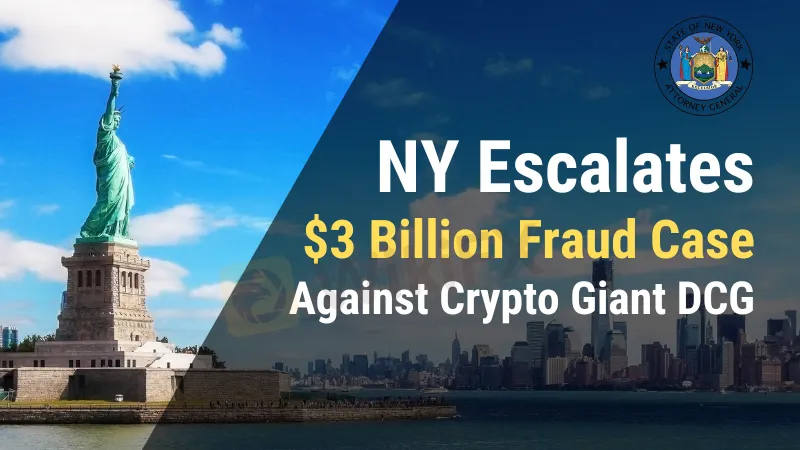简体中文
繁體中文
English
Pусский
日本語
ภาษาไทย
Tiếng Việt
Bahasa Indonesia
Español
हिन्दी
Filippiiniläinen
Français
Deutsch
Português
Türkçe
한국어
العربية
NY Escalates $3 Billion Fraud Case Against Crypto Giant DCG
Abstract:New York escalates a lawsuit against DCG and Barry Silbert, accusing them of a $3 billion fraud affecting over 230,000 investors. The legal battle intensifies.

With the growth of legal action in the digital financial world, New York's legal authorities have escalated their claims against Digital Currency Group (DCG), a prominent player in the cryptocurrency industry. The case has been amended to include a demand for more than $3 billion against DCG and its CEO, Barry Silbert, accusing them of a massive fraud operation that has damaged over 230,000 investors.
The heart of the issue stems from a series of charges that DCG, its subsidiary Genesis Global Capital (Genesis), and cryptocurrency exchange Gemini Trust Company participated in misleading tactics. Initially, the case, filed in October 2023, identified deceptive material about the Gemini Earn program, which was marketed as a low-risk investment option. This scheme, however, resulted in losses of more than $1 billion, dealing a huge blow to investor confidence and financial stability.
As the legal processes continue, Attorney General Letitia James has accused DCG and Genesis of putting up a complicated veneer to conceal their dire financial situation. The use of a $1.1 billion promissory note, allegedly intended to conceal Genesis' financial weaknesses, is central to this claim. This strategy, coupled with other misleading activities, allegedly deceived investors about Genesis' operational sustainability and the safety of their investment funds.
Attorney General James' assertion that DCG's operations were rife with fraudulent activity that misled investors about the security of their money and the general viability of the investment programs offered complicates the deception story even further. “The fraud and deception were so widespread that many more people have come forward to report similar harm,” James said, highlighting the scope and depth of the alleged fraudulent actions.

This legal battle is about more than just seeking compensation for wronged investors; it also highlights a larger effort by Attorney General James to strengthen regulatory oversight of the cryptocurrency industry. The measures include introducing entire cryptocurrency legislation for New York to improve rules and suing fraudulent and deceptive crypto firms. This coordinated effort includes warnings and assistance for both investors and industry professionals, indicating a comprehensive plan to safeguard market integrity and investor interest.
The lawsuit's extension to seek more than $3 billion in reparations demonstrates the gravity of the claims and New York's legal authorities' determination to confront and correct the alleged malpractices. This legal action against DCG and its founders highlights the increasing scrutiny and regulatory pressure on the cryptocurrency business, which is growing more unpredictable and riskier for investors.
This case has far-reaching repercussions for DCG and its stockholders. It is a watershed moment in the cryptocurrency market's regulatory environment, indicating possibly more regulation and enforcement measures in the future. The court decision might set norms for accountability and operational transparency in the digital currency space, impacting industry practices and investor protections.
As the court struggle plays out, the Bitcoin sector and its stakeholders are closely watching what happens. The lawsuit against DCG and Barry Silbert shows the complexity of regulating the digital financial ecosystem and the necessity for robust regulatory frameworks to combat fraud and protect market integrity. The developing tale emphasizes the hazards and complexity of the rapidly expanding cryptocurrency industry, as well as the need for regulatory and legal safeguards to protect investors' interests and market stability.
Stay ahead in the financial world with the latest updates. For more on the DCG lawsuit and other crucial market news, visit WikiFX Daily News today!

Disclaimer:
The views in this article only represent the author's personal views, and do not constitute investment advice on this platform. This platform does not guarantee the accuracy, completeness and timeliness of the information in the article, and will not be liable for any loss caused by the use of or reliance on the information in the article.
Read more

Authorities Alert: MAS Impersonation Scam Hits Singapore
MAS scam alert: Scammers impersonate officials, causing $614K losses in Singapore since March 2025. Learn how to spot and avoid this impersonation scam.

Billboard Warns of Crypto Scams Using Its Name – Stay Alert!
Billboard warns against fake crypto scams using its brand. Learn how to spot fraud and protect yourself from fake promotions.

Rising WhatsApp Scams Highlight Need for Stronger User Protections
UK consumers lose £2,437 on average to WhatsApp scams. Revolut demands stricter verification and AI monitoring to combat rising fraud on Meta platforms.

Interactive Brokers Launches Forecast Contracts in Canada for Market Predictions
Interactive Brokers introduces Forecast Contracts in Canada, enabling investors to trade on economic, political, and climate outcomes. Manage risk with ease.
WikiFX Broker
Latest News
The Withdrawal Trap: How Scam Brokers Lure Victims into Paying More
FCA to Investors: Think Twice Before Trusting These Brokers
Trump\s tariffs: How could they affect the UK and your money
Trump gambles it all on global tariffs he\s wanted for decades
TradingView Brings Live Market Charts to Telegram Users with New Mini App
Trump tariffs: How will India navigate a world on the brink of a trade war?
Interactive Brokers Launches Forecast Contracts in Canada for Market Predictions
Authorities Alert: MAS Impersonation Scam Hits Singapore
IG Group Acquires Freetrade for £160M to Expand UK Investment Market
U.S. March ISM Manufacturing PMI Released
Currency Calculator







